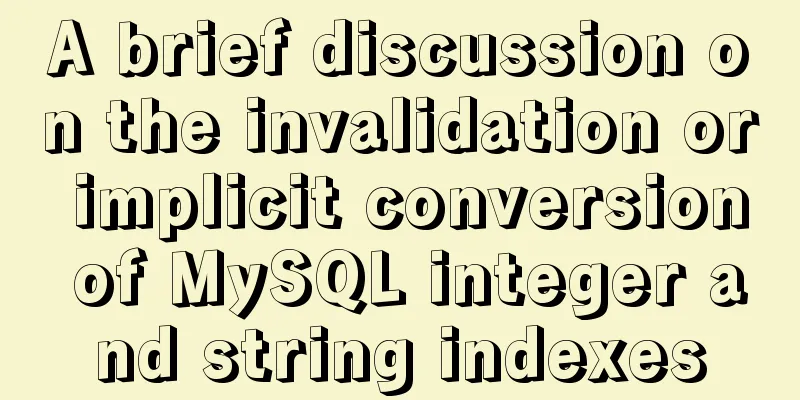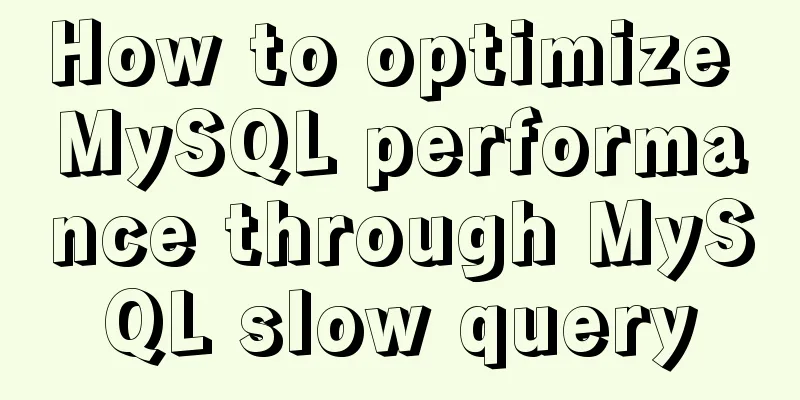A brief discussion on the invalidation or implicit conversion of MySQL integer and string indexes

Problem OverviewToday at work, the DBA suddenly found a piece of SQL, indicating that the SQL had implicit conversion and did not use the index. After checking, we found that it was a varchar type field. We used conditions to pass in a numeric value. Due to concerns about violating the confidentiality agreement, I will not post the picture here. Let me reproduce a similar situation for everyone to see. Problem ReproductionFirst, we create a user table test_user, in which USER_ID is set to varchar type and a unique index is added for the sake of effect. CREATE TABLE test_user ( ID int(11) NOT NULL AUTO_INCREMENT, USER_ID varchar(11) DEFAULT NULL COMMENT 'User account', USER_NAME varchar(255) DEFAULT NULL COMMENT 'User name', AGE int(5) DEFAULT NULL COMMENT 'Age', COMMENT varchar(255) DEFAULT NULL COMMENT 'Introduction', PRIMARY KEY (ID) UNIQUE KEY UNIQUE_USER_ID (USER_ID) USING BTREE )ENGINE=InnoDB DEFAULT CHARSET=utf8; The table data is as follows (the data still uses the same data as the last MySQL article MySQL uses UNION to connect two queries and sorting fails, but please note that the table structure is different.)
Next we execute the following sql EXPLAIN SELECT * FROM test_user WHERE USER_ID = 111; The explanations given are found to be as follows:
We put the condition in quotation marks and explain it as follows: EXPLAIN SELECT * FROM test_user WHERE USER_ID = '111'; At this time, we found that the varchar type field uses the index when it is queried as a string, but does not use the index when it is queried as a numeric type. Problem extensionSo the question is, if the field is an integer and has an index, will the index not be used when querying with a string? Practice makes perfect, let’s continue testing it. -- Change the type of USER_ID to integer CREATE TABLE test_user ( ID int(11) NOT NULL AUTO_INCREMENT, USER_ID int(11) DEFAULT NULL COMMENT 'User account', USER_NAME varchar(255) DEFAULT NULL COMMENT 'User name', AGE int(5) DEFAULT NULL COMMENT 'Age', COMMENT varchar(255) DEFAULT NULL COMMENT 'Introduction', PRIMARY KEY (ID), UNIQUE KEY UNIQUE_USER_ID (USER_ID) USING BTREE ) ENGINE=InnoDB AUTO_INCREMENT=6 DEFAULT CHARSET=utf8; EXPLAIN SELECT * FROM test_user WHERE USER_ID = 111; EXPLAIN SELECT * FROM test_user WHERE USER_ID = '111'; After executing the above two statements, we found that int type fields will be indexed regardless of whether they are queried as strings or numerical values. in conclusion
To sum up, I think it is best to add quotation marks when writing SQL in the future to avoid the situation where string types are not indexed. The deeper principles need to be explored further. If you have any opinions, please discuss them. This is the end of this article about the invalidation or implicit conversion of MySql integer index and string index. For more information about the invalidation of MySql integer index and string index, please search for previous articles on 123WORDPRESS.COM or continue to browse the following related articles. I hope you will support 123WORDPRESS.COM in the future! You may also be interested in:
|
<<: How to write HTML head in mobile device web development
>>: Independent implementation of nginx container configuration file
Recommend
Modify the boot time of grub in ubuntu
The online search to modify the grub startup time...
Public multi-type attachment image upload area in Vue page and applicable folding panel (sample code)
In front-end projects, attachment uploading is a ...
CSS3 flip card number sample code
I received a task from the company today, and the...
A brief discussion on when MySQL uses internal temporary tables
union execution For ease of analysis, use the fol...
Solution to the problem that the Vue page image does not display
When making a new version of the configuration in...
Building a KVM virtualization platform on CentOS7 (three ways)
KVM stands for Kernel-based Virtual Machine, whic...
Summary of react basics
Table of contents Preface start React Lifecycle R...
The process of building a Jenkins project under Linux (taking CentOS 7 as an example)
Take the deployment of https://gitee.com/tengge1/...
Detailed explanation of creating stored procedures and functions in mysql
Table of contents 1. Stored Procedure 1.1. Basic ...
Detailed explanation of Vue's hash jump principle
Table of contents The difference between hash and...
How to run MySQL in Docker environment and enable Binlog to configure master-slave synchronization
The same server simulates the master-slave synchr...
Implementation of Vue single file component
I recently read about vue. I found a single-file ...
javascript Blob object to achieve file download
Table of contents illustrate 1. Blob object 2. Fr...
A brief analysis of the responsiveness principle and differences of Vue2.0/3.0
Preface Since vue3.0 was officially launched, man...
24 Practical JavaScript Development Tips
Table of contents 1. Initialize the array 2. Arra...









